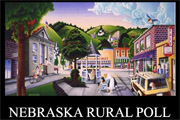Agricultural Economics, Department of

Nebraska Rural Poll
Broadband and Mobile Internet Services in Nonmetropolitan Nebraska: 2016 Nebraska Rural Poll Results
Date of this Version
6-2016
Document Type
Report
Citation
Nebraska Rural Poll, Research Report (June 2016) 16-1, 26 pages
Institute of Agriculture and Natural Resources, University of Nebraska-Lincoln
Also available at https://ruralpoll.unl.edu/pdf/16broadband.pdf
Abstract
Most rural Nebraskans use their cell phone to access the Internet. Certain groups are more likely than others to use mobile/cellular Internet service: rural Nebraskans with the highest household incomes, who are younger, married, with higher education levels and with management or professional occupations.
Overall, most rural Nebraskans using mobile/cellular Internet service are satisfied with their service. Furthermore, most rural Nebraskans are satisfied with the reliability, speed, customer service, and coverage of their mobile Internet service. However, most rural Nebraskans using mobile Internet service are dissatisfied with the price of their service.
Certain groups have issues with various aspects of their mobile Internet service. Less than four in ten persons with occupations in agriculture are satisfied with the reliability of their mobile Internet service. In fact, over one-half of this occupation group is dissatisfied with the reliability of their mobile Internet service. And, persons living in or near the smallest communities are less likely than persons living in or near the largest communities to report satisfaction with the speed of their mobile Internet service. Persons living in the Northeast region of the state are less likely than persons living in other regions of the state to express satisfaction with the coverage of their mobile Internet service.
Over eight in ten rural Nebraskans subscribe to a high-speed Internet service at home (such as cable Internet, DSL, fiber optic or satellite Internet service) other than a data plan on their cell phone or tablet. Six percent say they only use their cell phone data plan. Nine percent do not subscribe to any Internet service at home and do not have a cell phone data plan. Two percent have only dial-up Internet service.
A digital divide still exists in the nonmetropolitan counties of the state. Rural Nebraskans living in or near larger communities, with higher household incomes, who are younger, who are married, with higher education levels and with occupations classified as other are the groups most likely to subscribe to high-speed Internet services at home.
Most rural Nebraskans with home Internet service are satisfied with their service overall. Furthermore, most rural Nebraskans with home Internet service are satisfied with the reliability, speed and customer service of their home service. However, most rural Nebraskans with home Internet service are dissatisfied with the price of their service.
As was the case with mobile Internet service, certain groups have issues with their home Internet service. Persons living in or near smaller communities are less likely than persons living in or near larger communities to report satisfaction with the speed of their home Internet service. Residents of the Northeast region are less likely than residents of other regions of the state to be satisfied overall with their home Internet service.
Most rural Nebraskans see value in having high-speed Internet access for various items. Over seven in ten rural Nebraskans feel having high-speed Internet access is important or very important for the following items: searching for/applying for jobs, children’s education and learning new things. Younger persons in particular are one group that is more likely to say having high-speed Internet access is important for most of the items listed. As one example, younger persons are more likely than older persons to think having high-speed Internet access is important for monitoring or managing health care.
Included in
Agribusiness Commons, Agricultural and Resource Economics Commons, Civic and Community Engagement Commons, Community-Based Research Commons, Demography, Population, and Ecology Commons, Entrepreneurial and Small Business Operations Commons, Place and Environment Commons, Public Affairs, Public Policy and Public Administration Commons, Regional Economics Commons, Rural Sociology Commons

